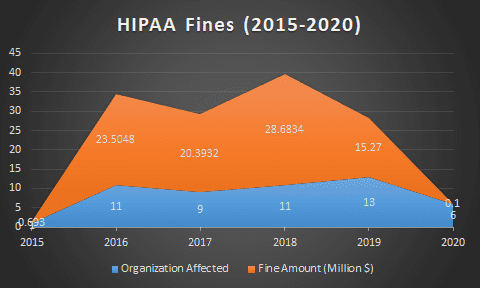Table of Contents
The Health Insurance Portability and Accountability Act of 1996, is known as HIPAA. The act describes a bunch of standards to prevent disclosure of electronically Protected Health Information (ePHI). The U.S. Department of Health and Human Services (HHS) regulates HIPAA compliance and it is enforced by the Office for Civil Rights (OCR). The U.S. healthcare service providers and business associates are obliged to comply with HIPAA. Any breach of ePHI or failure to comply can result in a huge fine imposed by HHS. Considering the huge fines paid by healthcare organizations as can be seen in the graph below, we are here to introduce the three safeguards for a HIPAA Audit to reduce compliance risk.
Three Safeguards of HIPAA Audit
Healthcare service providers and business associates can easily reduce the HIPAA compliance risk following three safeguards for a HIPAA audit:
1. Technical Safeguards
A few technical aspects can help covered entities to comply with HIPAA. Here are some significant aspects of technical safeguards:
- Implementing a means of access control.
- Introducing a mechanism to authenticate ePHI.
- Implementing tools for encryption and decryption.
- Introducing activity logs and audit controls.
- Facilitating automatic log-off of ePHI devices.
2. Physical Safeguards
Physical safeguards include the measures for visible threats, and guidelines for HIPAA compliance as following:
- Implementing facility access controls.
- Initiating policies for the use/positioning of workstations.
- Initiating policies for mobile devices.
- Maintaining a proper inventory of hardware.
3. Administrative Safeguards
Administrative safeguards should be implemented for enforcing technical and physical safeguards. It includes risk assessments and some preventive and corrective measures as below:
- Conducting risk assessments.
- Introducing risk management policies.
- Initiating training and learning for employees.
- Developing and testing a contingency plan.
- Restricting third-party access.
- Reporting security incidents.
All these three safeguards can make the efficient transition for dealing successfully with ePHI but still now even the larger healthcare service providers are struggling to comply with HIPAA. Among all of these critical measures, HIPAA Ready has introduced its user-friendly web and mobile application that helps organizations and business associates to comply with the requirements. To experience this amazing app that can help your organization to reduce HIPAA compliance risk, request a demo here.
What is CloudApper AI Platform?
CloudApper AI is an advanced platform that enables organizations to integrate AI into their existing enterprise systems effortlessly, without the need for technical expertise, costly development, or upgrading the underlying infrastructure. By transforming legacy systems into AI-capable solutions, CloudApper allows companies to harness the power of Generative AI quickly and efficiently. This approach has been successfully implemented with leading systems like UKG, Workday, Oracle, Paradox, Amazon AWS Bedrock and can be applied across various industries, helping businesses enhance productivity, automate processes, and gain deeper insights without the usual complexities. With CloudApper AI, you can start experiencing the transformative benefits of AI today. Learn More


















